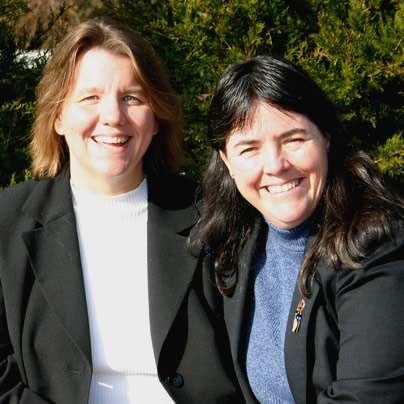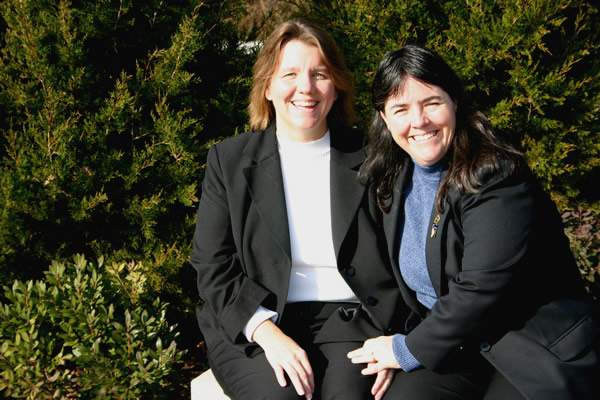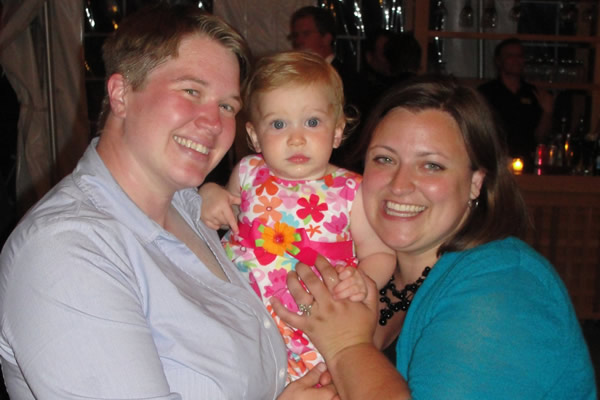National
Married gay couples reap benefits from DOMA ruling
But some encounter confusion, delays from employers


Mary Glantz and Michelle Schohn of Arlington, Va., at their Provincetown, Mass., wedding in November 2009. (Photo courtesy of Michelle Schohn)
The majority of legally married gay couples with whom the Washington Blade has spoken in recent days said they have had little difficulty receiving benefits for their spouses after the U.S. Supreme Court found a portion of the Defense of Marriage Act (DOMA) unconstitutional.
Michelle Schohn of Arlington, Va., a State Department employee who married her partner of 14 years, Mary Glantz, in Provincetown, Mass., in 2009, told the Blade on Tuesday from Estonia that the agency’s HR personnel recognized the couple as married “within hours” after she faxed them a copy of their marriage license. The couple was also able to update their federal life insurance policy.
Schohn said the USAA also pre-approved her and Glantz for a mortgage to potentially buy a home in Maryland as a married couple.
“It’s been amazingly straight-forward and very easy,” Schohn, who was the president of the Gays and Lesbians in Foreign Affairs Agencies from 2008-2009, said. “The several people that I’ve worked with so far have been very friendly and accommodating. I haven’t had any kind of pushback from anyone.”
The Office of Personnel Management on June 28 issued a memorandum that outlined the benefits for which legally married gay and lesbian federal employees and their children or stepchildren are now eligible. These include health, dental, vision, life and long-term insurance, retirement benefits and the ability to submit claims for medical expenses through flexible spending accounts.
Alex Hardin, who works in the State Department’s Bureau of European Affairs, told the Blade during GLIFAA’s monthly happy hour at the Capitol Skyline Hotel in Southwest D.C. on Tuesday that he and his partner, who is from Japan, are planning to get married in the nation’s capital later this summer.
The DOMA decision opened the door for legally married gays and lesbians to sponsor their foreign-born partners for immigration purposes.
Secretary of Homeland Security Janet Napolitano on July 1 said her agency will treat marriage-based green card applications from same-sex bi-national couples the same as those submitted by heterosexuals.
Hardin’s partner already has a green card, but he told the Blade the Supreme Court’s DOMA ruling eliminates any uncertainty over the status of their relationship once they tie the knot.
“Now we can feel more comfortable knowing that we’re going to be married, we’re going to have the rights and privileges of everybody else,” Hardin said.
Eleven states and D.C. currently allow same-sex marriage. Gays and lesbians will be able to legally tie the knot in Minnesota and Rhode Island on Aug. 1.
The American Civil Liberties Union on Tuesday filed a lawsuit that challenges Pennsylvania’s statuary ban on nuptials for gays and lesbians. The group also plans to contest constitutional amendments in Virginia and North Carolina that define marriage as between a man and a woman.
The ACLU and the National Center for Lesbian Rights in March petitioned the New Mexico Supreme Court to rule on whether same-sex couples can legally marry in the state. Same-sex marriage lawsuits have also been filed in Michigan and Nevada, while motions have been filed in Illinois and New Jersey that seek expedited rulings in cases that seek nuptials for gays and lesbians in the two states.
The Human Rights Campaign, Freedom to Marry and other groups have also launched campaigns to challenge same-sex marriage bans in Arkansas, Florida, Oregon and other states.
Missy Novak of South Deerfield, Mass., contacted the company for which she and her wife both work after the Supreme Court issued its DOMA decision to see whether they and their daughter are now eligible for a family health insurance plan.
The company issued a memo that said “guidance is anticipated” from the Internal Revenue Service and the Department of Labor on “how the ruling affects the laws they enforce.”
Novak said the company told her on Tuesday that it is still waiting to hear from the two agencies.
“We’re kind of eager to hear back from our employer on when are you guys going to be changing this,” she told the Blade.
OPM has said in a series of memos it released after the DOMA ruling that federal gay employees who have entered into civil unions will remain ineligible for most of the benefits that legally married same-sex couples are now able to receive.
GLIFAA President Ken Kero-Mentz said retirement plans are among the issues that still need to be sorted out.
He described the impact of the DOMA decision — specifically the impact it has had on immigration and insurance benefits for gays and lesbians who were unable to obtain federal health insurance benefits while living overseas with their same-sex spouses — as “enormous.”
“DOMA had a particularly hateful effect, especially for us in the foreign service community,” Kero-Mentz said. “We’re able to celebrate that much more within our smaller community because these two massive barriers have now been lifted.”
U.S. Supreme Court
Supreme Court to consider bans on trans athletes in school sports
27 states have passed laws limiting participation in athletics programs

The U.S. Supreme Court on Thursday agreed to hear two cases involving transgender youth challenging bans prohibiting them from participating in school sports.
In Little v. Hecox, plaintiffs represented by the ACLU, Legal Voice, and the law firm Cooley are challenging Idaho’s 2020 ban, which requires sex testing to adjudicate questions of an athlete’s eligibility.
The 9th U.S. Circuit Court of Appeals described the process in a 2023 decision halting the policy’s enforcement pending an outcome in the litigation. The “sex dispute verification process, whereby any individual can ‘dispute’ the sex of any female student athlete in the state of Idaho,” the court wrote, would “require her to undergo intrusive medical procedures to verify her sex, including gynecological exams.”
In West Virginia v. B.P.J., Lambda Legal, the ACLU, the ACLU of West Virginia, and Cooley are representing a trans middle school student challenging the Mountain State’s 2021 ban on trans athletes.
The plaintiff was participating in cross country when the law was passed, taking puberty blockers that would have significantly reduced the chances that she could have a physiological advantage over cisgender peers.
“Like any other educational program, school athletic programs should be accessible for everyone regardless of their sex or transgender status,” said Joshua Block, senior counsel for the ACLU’s LGBTQ and HIV Project. “Trans kids play sports for the same reasons their peers do — to learn perseverance, dedication, teamwork, and to simply have fun with their friends,” Block said.
He added, “Categorically excluding kids from school sports just because they are transgender will only make our schools less safe and more hurtful places for all youth. We believe the lower courts were right to block these discriminatory laws, and we will continue to defend the freedom of all kids to play.”
“Our client just wants to play sports with her friends and peers,” said Lambda Legal Senior Counsel Tara Borelli. “Everyone understands the value of participating in team athletics, for fitness, leadership, socialization, and myriad other benefits.”
Borelli continued, “The U.S. Court of Appeals for the Fourth Circuit last April issued a thoughtful and thorough ruling allowing B.P.J. to continue participating in track events. That well-reasoned decision should stand the test of time, and we stand ready to defend it.”
Shortly after taking control of both legislative chambers, Republican members of Congress tried — unsuccessfully — to pass a national ban like those now enforced in 27 states since 2020.
Federal Government
UPenn erases Lia Thomas’s records as part of settlement with White House
University agreed to ban trans women from women’s sports teams

In a settlement with the Trump-Vance administration announced on Tuesday, the University of Pennsylvania will ban transgender athletes from competing and erase swimming records set by transgender former student Lia Thomas.
The U.S. Department of Education’s Office for Civil Rights found the university in violation of Title IX, the federal rights law barring sex based discrimination in educational institutions, by “permitting males to compete in women’s intercollegiate athletics and to occupy women-only intimate facilities.”
The statement issued by University of Pennsylvania President J. Larry Jameson highlighted how the law’s interpretation was changed substantially under President Donald Trump’s second term.
“The Department of Education OCR investigated the participation of one transgender athlete on the women’s swimming team three years ago, during the 2021-2022 swim season,” he wrote. “At that time, Penn was in compliance with NCAA eligibility rules and Title IX as then interpreted.”
Jameson continued, “Penn has always followed — and continues to follow — Title IX and the applicable policy of the NCAA regarding transgender athletes. NCAA eligibility rules changed in February 2025 with Executive Orders 14168 and 14201 and Penn will continue to adhere to these new rules.”
Writing that “we acknowledge that some student-athletes were disadvantaged by these rules” in place while Thomas was allowed to compete, the university president added, “We recognize this and will apologize to those who experienced a competitive disadvantage or experienced anxiety because of the policies in effect at the time.”
“Today’s resolution agreement with UPenn is yet another example of the Trump effect in action,” Education Secretary Linda McMahon said in a statement. “Thanks to the leadership of President Trump, UPenn has agreed both to apologize for its past Title IX violations and to ensure that women’s sports are protected at the university for future generations of female athletes.”
Under former President Joe Biden, the department’s Office of Civil Rights sought to protect against anti-LGBTQ discrimination in education, bringing investigations and enforcement actions in cases where school officials might, for example, require trans students to use restrooms and facilities consistent with their birth sex or fail to respond to peer harassment over their gender identity.
Much of the legal reasoning behind the Biden-Harris administration’s positions extended from the 2020 U.S. Supreme Court case Bostock v. Clayton County, which found that sex-based discrimination includes that which is based on sexual orientation or gender identity under Title VII rules covering employment practices.
The Trump-Vance administration last week put the state of California on notice that its trans athlete policies were, or once were, in violation of Title IX, which comes amid the ongoing battle with Maine over the same issue.
New York
Two teens shot steps from Stonewall Inn after NYC Pride parade
One of the victims remains in critical condition

On Sunday night, following the annual NYC Pride March, two girls were shot in Sheridan Square, feet away from the historic Stonewall Inn.
According to an NYPD report, the two girls, aged 16 and 17, were shot around 10:15 p.m. as Pride festivities began to wind down. The 16-year-old was struck in the head and, according to police sources, is said to be in critical condition, while the 17-year-old was said to be in stable condition.
The Washington Blade confirmed with the NYPD the details from the police reports and learned no arrests had been made as of noon Monday.
The shooting took place in the Greenwich Village neighborhood of Manhattan, mere feet away from the most famous gay bar in the city — if not the world — the Stonewall Inn. Earlier that day, hundreds of thousands of people marched down Christopher Street to celebrate 55 years of LGBTQ people standing up for their rights.
In June 1969, after police raided the Stonewall Inn, members of the LGBTQ community pushed back, sparking what became known as the Stonewall riots. Over the course of two days, LGBTQ New Yorkers protested the discriminatory policing of queer spaces across the city and mobilized to speak out — and throw bottles if need be — at officers attempting to suppress their existence.
The following year, LGBTQ people returned to the Stonewall Inn and marched through the same streets where queer New Yorkers had been arrested, marking the first “Gay Pride March” in history and declaring that LGBTQ people were not going anywhere.
New York State Assemblywoman Deborah Glick, whose district includes Greenwich Village, took to social media to comment on the shooting.
“After decades of peaceful Pride celebrations — this year gun fire and two people shot near the Stonewall Inn is a reminder that gun violence is everywhere,” the lesbian lawmaker said on X. “Guns are a problem despite the NRA BS.”





















